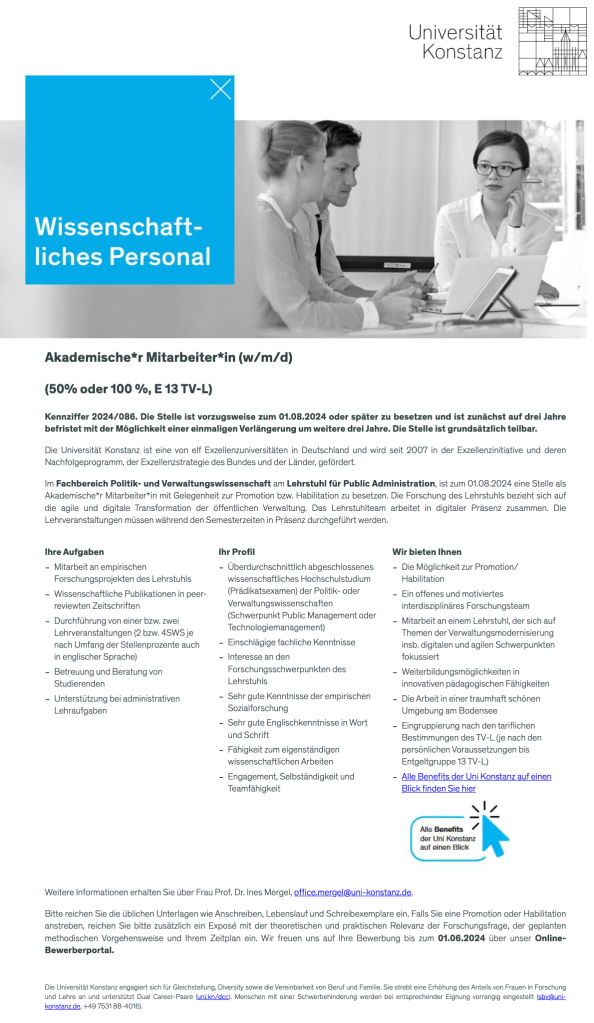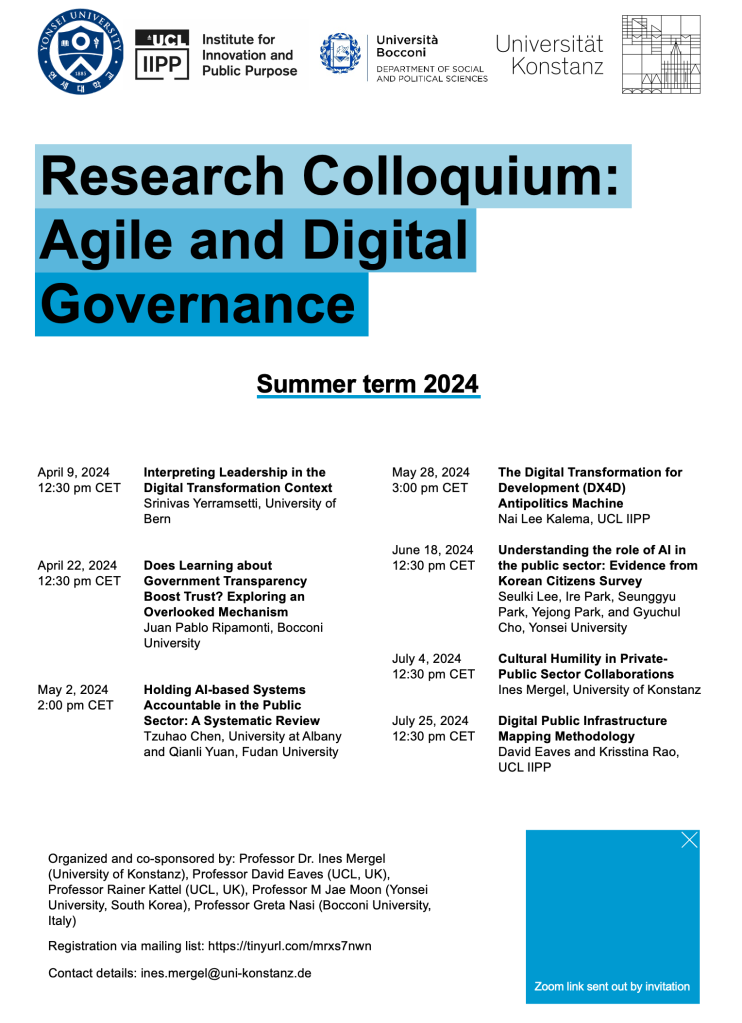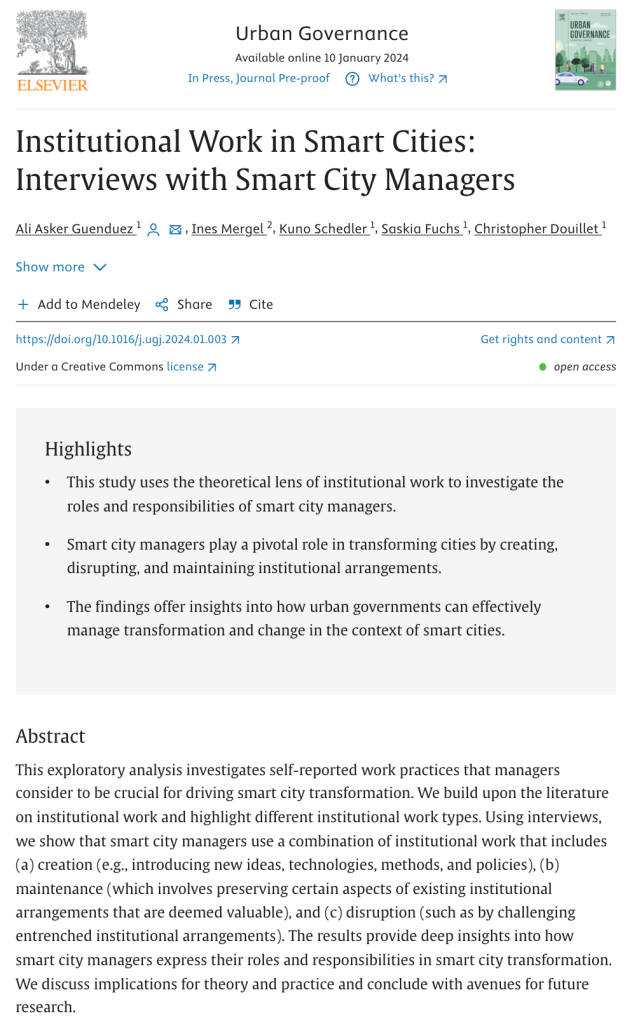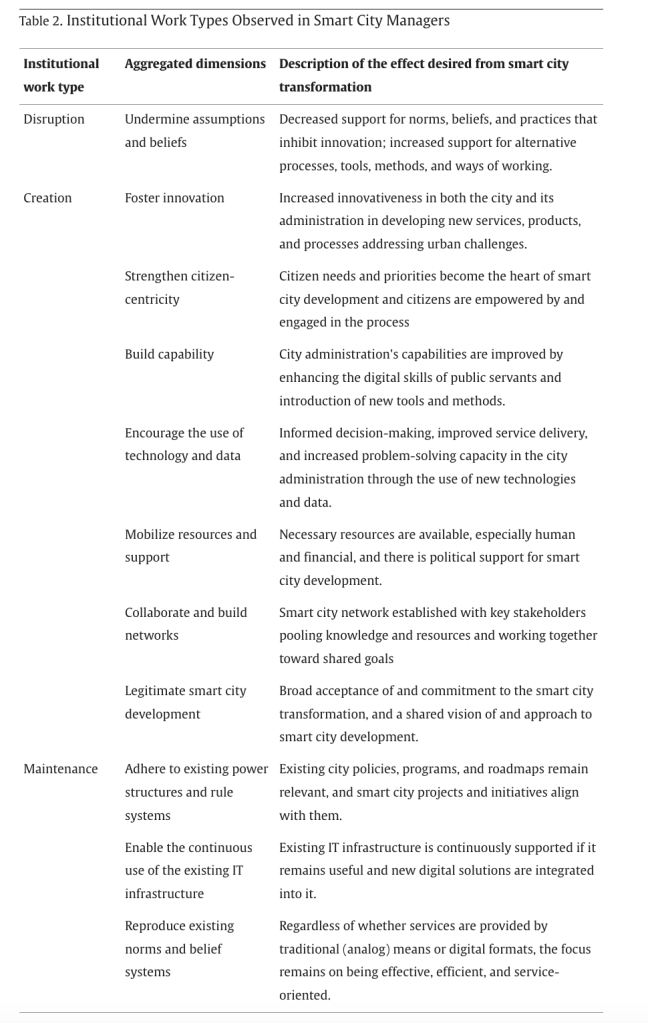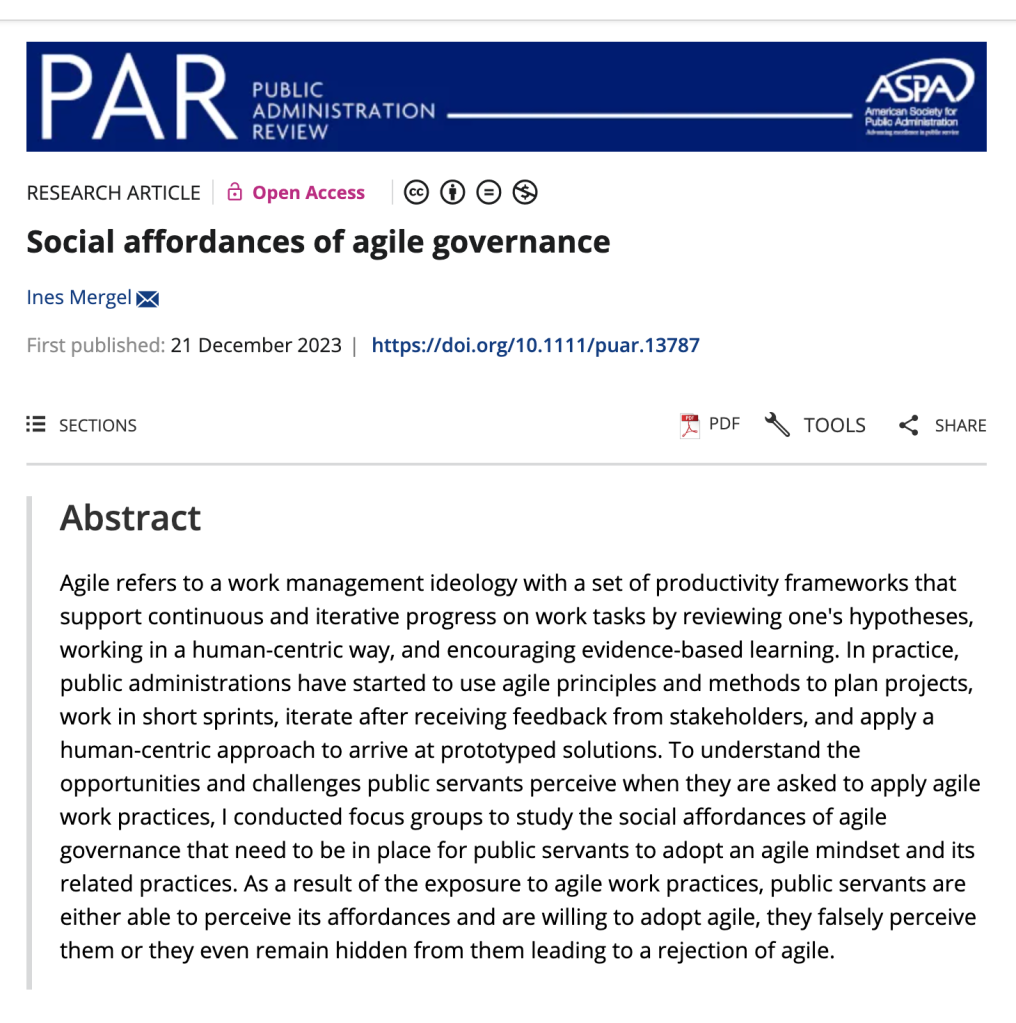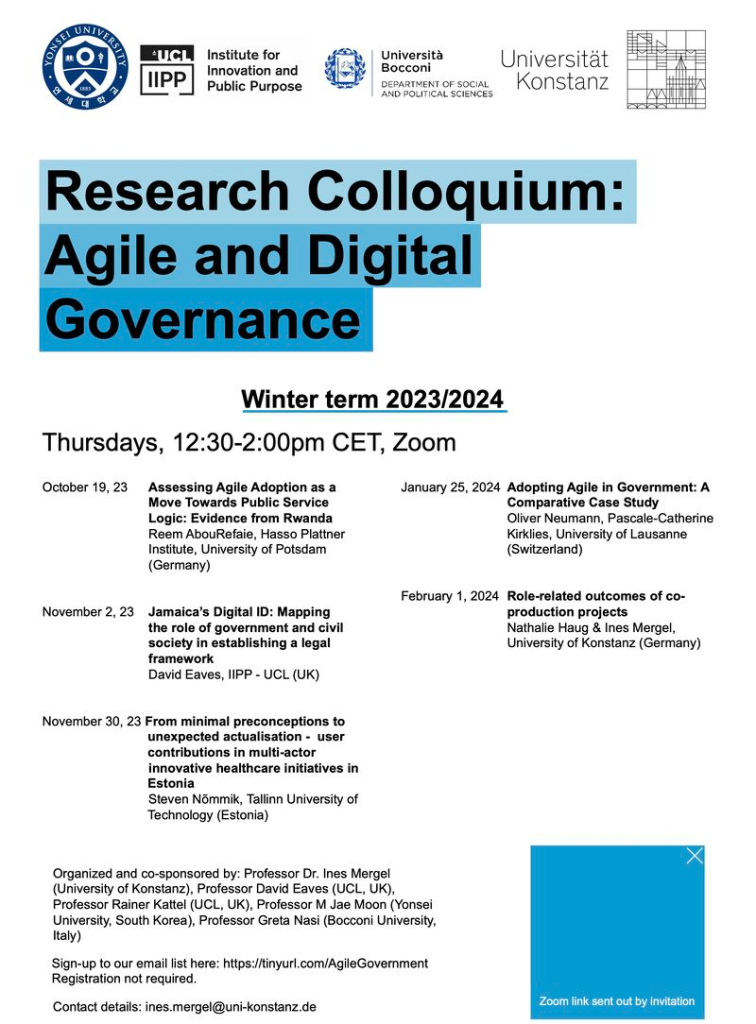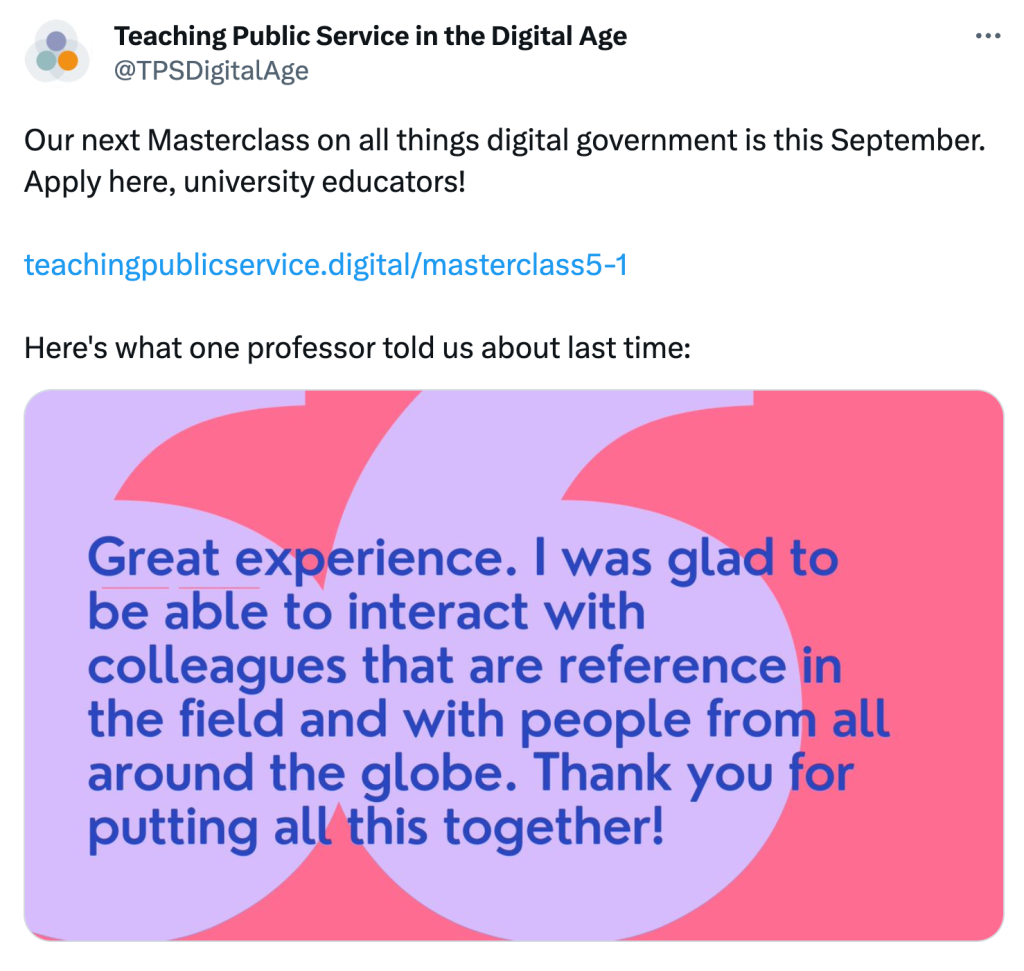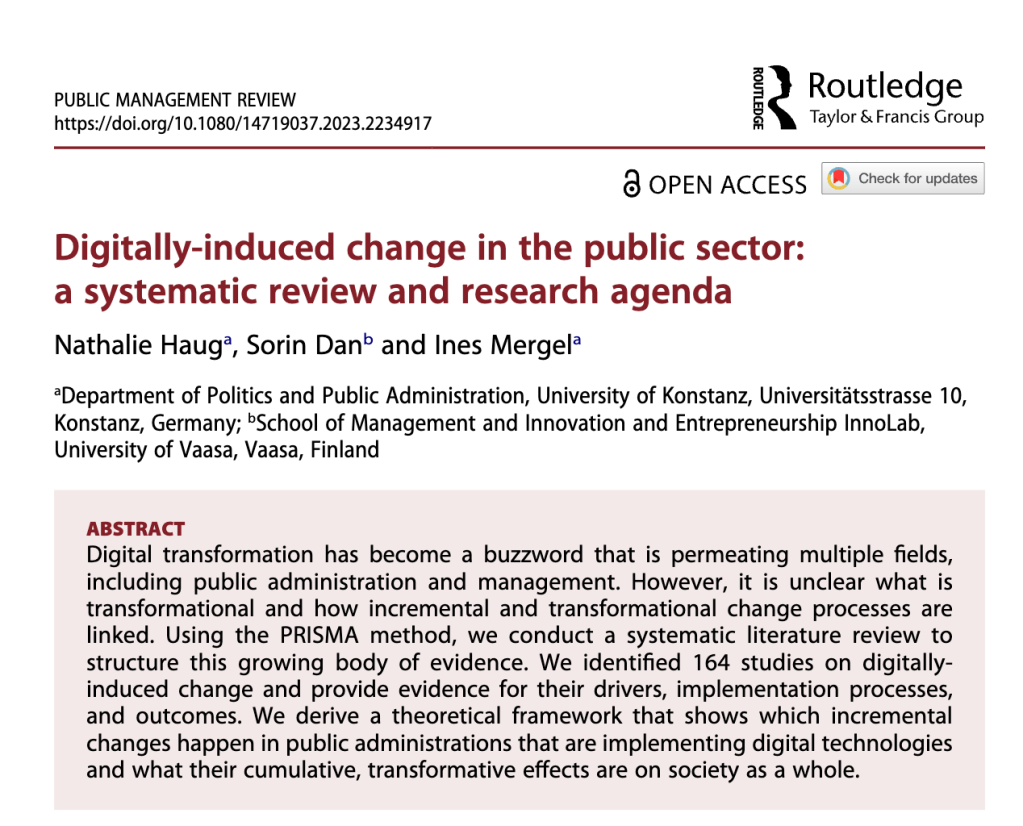Guest editors: Mila Gasco, Albert Meijer, Ines Mergel, Jae Moon, Greta Nasi
The adoption of information and communication technologies in public administrations is a topic that has been discussed previously. It goes back at least to the last century (Janowski 2015). Over time, several studies have focused on the use of Information and Communication Technologies (ICT) in the public sector, focusing on the ICT contribution to service provision and the automation and digitalization of processes, the legitimacy of government, and its capacity to meet their constituents’ needs. More recently, the pandemic and the pace at which emerging technologies are being implemented have fundamentally changed the notion of digital, bringing increasing attention to the profound digital transformation, encompassing both internal administrative processes and external citizen services (Gong, Yang and Shi, 2020; Mergel et al., 2019).
While existing literature often frames this shift as a technological challenge, the practical reality for public managers and civil servants is that it represents a significant institutional, organizational and personnel development endeavor (Cordella and Bonina, 2012). First, this transformative process poses a significant organizational and capacity challenge to reassess administrative practices and routines (Gasco-Hernandez et al., 2022; Mergel et al. 2019). It also prompts inquiries into whether digital transformation truly contributes to value generation. New approaches may be, therefore, needed to better understand this phenomenon. In this respect, agile digital transformation, characterized by using agile methodologies to reshape an organization’s digital capabilities in response to evolving needs and technological advancements, may offer a flexible and iterative perspective (Mergel et al., 2018; Mergel; Ganapati, Whitford, 2019).
Second, user engagement emerges as a pivotal factor in ensuring the success and effectiveness of initiatives. Digital transformation requires adequate engagement and participation to design and implement digital services that meet stakeholders’ expectations, including citizens’, and that show their relevance and responsiveness to real needs (Distel and Lindgren, 2023; Gasco-Hernandez et al., 2022; Ashaye and Irani, 2019). But user engagement goes beyond mere participation; it involves fostering a collaborative approach known as co-production (Bovaird, 2007). Various analyses of digital coproduction have been presented in the literature, but an academic understanding of the relationship between coproduction and digital transformation is lacking (Meijer, 2012; Lember et al., 2019; Meijer & Boon, 2021).
Although existing literature underscores the importance of digital transformation, there still needs to be a gap in understanding the actual processes of digital transformation, including the use of agile approaches (Mergel, 2023, 2016). This symposium aims to explore the intricate dynamics of digital transformation within public administrations, focusing on the organizational, service, performance, and collaboration dimensions. Some of the key questions that the symposium aims to address include the preconditions for successful transformation; how public managers navigate the ambidexterity of simultaneously maintaining traditional administrative routines alongside agile practices, the transferability of results into existing administrative routines and legal contexts frameworks, how digital and agile transformations unfold; how co-production becomes particularly crucial for agile digital transformation, where the iterative and adaptive nature of the process necessitates continuous feedback and input from end-users; and.
The symposium seeks to address these gaps through a combination of theoretical foundations and empirical evidence. Papers may explore the evolving landscape and focus on insights into the challenges, opportunities, and leading practices that define the intersection of digital innovation, agile methodologies, and organizational change in the public sector.
Call for papers
This symposium seeks to address critical questions, including the necessary internal changes for the successful digital transformation, new modes of interaction with public servants and their clientele, the application of innovative work practices, including service design methodologies to the design of digital public services, the introduction and implementation of agile methods in public administrations, and the organizational, procedural, and technological outcomes of digitally transformed public administrations. The symposium also welcomes exploration of the role of organizational and institutional factors, digital transformation competencies and methods, evolving relationships with stakeholders, public value creation in digital transformation projects, and participation in digital transformation. Through this comprehensive exploration, the symposium aims to shed light on the intricate dynamics of digital transformation in public administrations and pave the way for a more nuanced understanding of these contemporary processes.
The symposium may include topics and research questions such as:
- How do internal administrative processes and external citizen services undergo digital transformation, and what are the organizational, service, and performance implications?
- What are the key challenges faced by public managers in maintaining traditional administrative routines alongside agile practices during digital transformation?
- What are the critical preconditions for achieving successful digital and agile transformation in public administrations?
- How can outcomes from new organizational routines and structures be effectively transferred into existing administrative routines and legal frameworks during digital transformation?
- How has the adoption of information and communication technologies evolved in public administrations, considering historical perspectives and recent advancements?
- What frameworks and methodologies define agile digital transformation in public sector organizations, and how do they contribute to flexibility and adaptability?
- How do active user engagement and co-production in the digital transformation of public services increase their usability and acceptance?
- What organizational arrangements facilitate successful digital and agile transformations, and how do these arrangements unfold in practice?
- How do public managers navigate the ambidexterity of simultaneously maintaining traditional administrative routines and implementing agile practices during digital transformation?
These topics and research questions aim to address critical gaps in understanding the complex dynamics of digital transformation, agile methodologies, and organizational change in the public sector, fostering a comprehensive exploration of theoretical foundations and empirical evidence.
The symposium aims to embrace a broad spectrum of research methodologies and theoretical perspectives that collectively enhance the depth and breadth of knowledge in this evolving domain. It welcomes manuscripts with diverse research strategies and designs, ranging from single case studies to comparative research employing multi-case analysis or panel designs. Both quantitative investigations and qualitative approaches are encouraged as viable methods of inquiry. The symposium also welcomes theoretical contributions that significantly advance the understanding of topics related to the dynamics of digital transformation in the current volatile times.
Positioning the proposed symposium within the journal Public Administration
The Symposium on “Unveiling the Dynamics of Digital Transformation in Public Administrations” finds an ideal home in the esteemed pages of Public Administration, a journal renowned for its global circulation and comprehensive coverage. In the contemporary landscape, public administrations worldwide are undergoing a profound digital metamorphosis, transcending mere technological challenges to encompass institutional, organizational, and personnel development. Public Administration, with its global reach, is well-positioned to capture and disseminate scholarly contributions that address these multifaceted aspects. This journal stands as a beacon for research that delves into the major administrative challenges posed by the digital era, generating theoretical advances and offering substantive insights. As we navigate the intricate terrain of reshaping administrative practices and routines in the digital age, the symposium aims to attract papers from a diverse, global audience, making Public Administration the natural platform for fostering international dialogue and knowledge exchange.
Public Administration has a well-established history of contributing to the exploration of the intersection between technologies and various topics within the realm of public administration. This encompasses investigations into how technologies shape service delivery, as exemplified by studies such as Foley and Alfonso (2009) and Nasi et al. (2011).
Moreover, the journal has contributed to advancing our understanding of the intricate relationship between technology and fundamental democratic principles, including legitimacy, transparency, and accountability. This is evidenced by research conducted by scholars such as Pina, Torres, and Royo (2007), Fraussen and Halpin (2018), and Margetts and John (2023). Additionally, Public Administration explores the impact of technologies on citizens’ satisfaction, as demonstrated by studies like Prokop and Tepe (2022). Through its rich tradition of scholarly inquiry, the journal continues to contribute valuable insights into the evolving landscape of technology and its multifaceted interactions with public administration.
This symposium significantly enhances and extends the scholarly contributions of the Public Administration journal by focusing on the dynamics of digital transformation within public administrations. It provides a specialized and in-depth examination of the organizational, service, performance, and collaboration dimensions of digital transformation. By addressing the existing gap in understanding the actual processes of digital and agile transformation, the symposium complements the journal’s existing body of knowledge.
The symposium contributes to Public Administration by investigating key questions surrounding the prerequisites for successful digital transformation, the challenges of maintaining traditional administrative routines alongside agile practices, and the mechanisms for integrating outcomes from new organizational structures into existing administrative frameworks. Through a combination of empirical evidence and theoretical foundations, the symposium aims to provide nuanced insights into the evolving landscape of technology in the public sector.
In essence, the symposium serves as a specialized forum within the broader scope of Public Administration, offering a focused exploration of the intersection of digital innovation, agile methodologies, and organizational change. Doing so enriches the journal’s content with contemporary and relevant discussions, fostering a deeper understanding of the complexities associated with the ongoing digital transformation within public administrations.
Timeline
Deadline for abstract proposals (about 1000 words, excluding references): September 1st, 2024
Feedback from guest editors: September 30th, 2024
Submission of full paper through PA system for peer-review: January 31st, 2025
Subject to the process of peer review, accepted papers will be published online as they are accepted, and the issue is planned to be published in the third quarter of 2026.
Format of contribution
High-quality submissions that offer theoretical and empirical contributions on emerging issues in digital transformation in government, focusing on insights into the challenges, opportunities, and leading practices that define the intersection of digital innovation, agile methodologies, citizens’ engagement, and organizational change in the public sector.
Αbstracts: Abstracts should be no longer than 1000 words, excluding references, and include the scope, methodology, preliminary findings, and contributions the manuscript makes. The deadline for abstract submission is September 1st, 2024. The format of research papers needs to comply with the styles of Public Administration.
Abstract proposals and the first paper draft should be in MS Word format and be submitted to Greta Nasi (greta.nasi@unibocconi.it) by email. Final submission of revised papers should be made directly to the online submission system.
References
Ashaye, O. R., & Irani, Z. (2019). The role of stakeholders in the effective use of e-government resources in public services. International Journal of Information Management, 49, 253-270.
Bovaird, T. (2007). Beyond engagement and participation: User and community coproduction of public services. Public administration review, 67(5), 846-860.
Cordella, A., & Bonina, C. M. (2012). A public value perspective for ICT enabled public sector reforms: A theoretical reflection. Government Information Quarterly, 29(4), 512-520.
Distel, B., & Lindgren, I. (2023). A matter of perspective: Conceptualizing the role of citizens in E-government based on value positions. Government Information Quarterly, 101837
Foley, P., & Alfonso, X. (2009). eGovernment and the transformation agenda. Public Administration, 87(2), 371-396.
Fraussen, B., & Halpin, D. (2018). How do interest groups legitimate their policy advocacy? Reconsidering linkage and internal democracy in times of digital disruption. Public administration, 96(1), 23-35.
Gasco-Hernandez, M., Nasi, G., Cucciniello, M., & Hiedemann, A. (2022). The role of organizational capacity to foster digital transformation in local governments: The case of three European smart cities. Urban Governance, 2(2), 236-246.
Gong, Y., Yang, J., & Shi, X. (2020). Towards a comprehensive understanding of digital transformation in government: Analysis of flexibility and enterprise architecture. Government Information Quarterly, 37(3), 101487.
Haug, N., Dan, S., & Mergel, I. (2023). Digitally-induced change in the public sector: a systematic review and research agenda. Public Management Review, 1-25.
Janowski, T. (2015). Digital government evolution: From transformation to contextualization. Government Information Quarterly, 32(3), 221-236.
Kettl, D. F. (2015). The transformation of governance: Public administration for the twenty-first century. Jhu Press.
Lember, V., Brandsen, T., & Tõnurist, P. (2019). The potential impacts of digital technologies on co-production and co-creation. Public Management Review, 21(11), 1665-1686.
Margetts, H., & John, P. (2023). How rediscovering nodality can improve democratic governance in a digital world. Public Administration.
Meijer, A. (2012). Co-production in an information age: Individual and community engagement supported by new media. Voluntas, 23, 1156-1172.
Meijer, A., & Boon, W. (2021). Digital platforms for the co-creation of public value. Policy & Politics, 49(2), 231-248.
Mergel, I., Edelmann, N., & Haug, N. (2019). Defining digital transformation: Results from expert interviews. Government Information Quarterly, 36(4), 101385.
Mergel, I. (2016). Agile innovation management in government: A research agenda. Government Information Quarterly, 33(3), 516-523.
Mergel, I., Gong, Y., & Bertot, J. (2018). Agile government: Systematic literature review and future research. Government Information Quarterly, 35(2), 291-298.
Mergel, I., Ganapati, S., & Whitford, A. B. (2021). Agile: A new way of governing. Public Administration Review, 81(1), 161-165.
Nasi, G., Frosini, F., & Cristofoli, D. (2011). Online service provision: are municipalities really innovative? The case of larger municipalities in Italy. Public Administration, 89(3), 821-839.
Osborne, S. P., Nasi, G., & Powell, M. (2021). Beyond co‐production: Value creation and public services. Public Administration, 99(4), 641-657.
Pina, V., Torres, L., & Royo, S. (2007). Are ICTs improving transparency and accountability in the EU regional and local governments? An empirical study. Public Administration, 85(2), 449-472.
Prokop, C., & Tepe, M. (2022). Talk or type? The effect of digital interfaces on citizens’ satisfaction with standardized public services. Public Administration, 100(2), 427-443.
